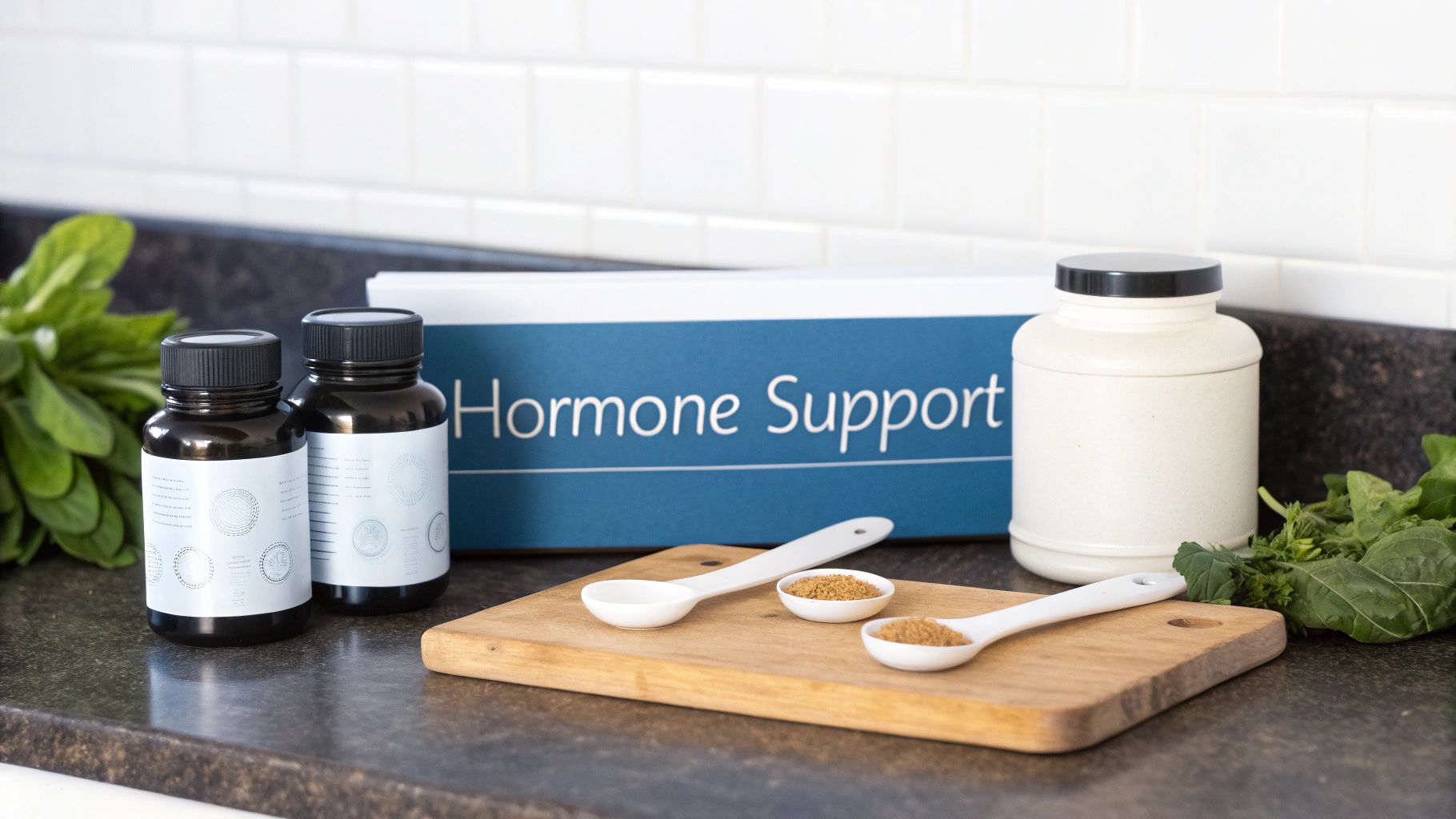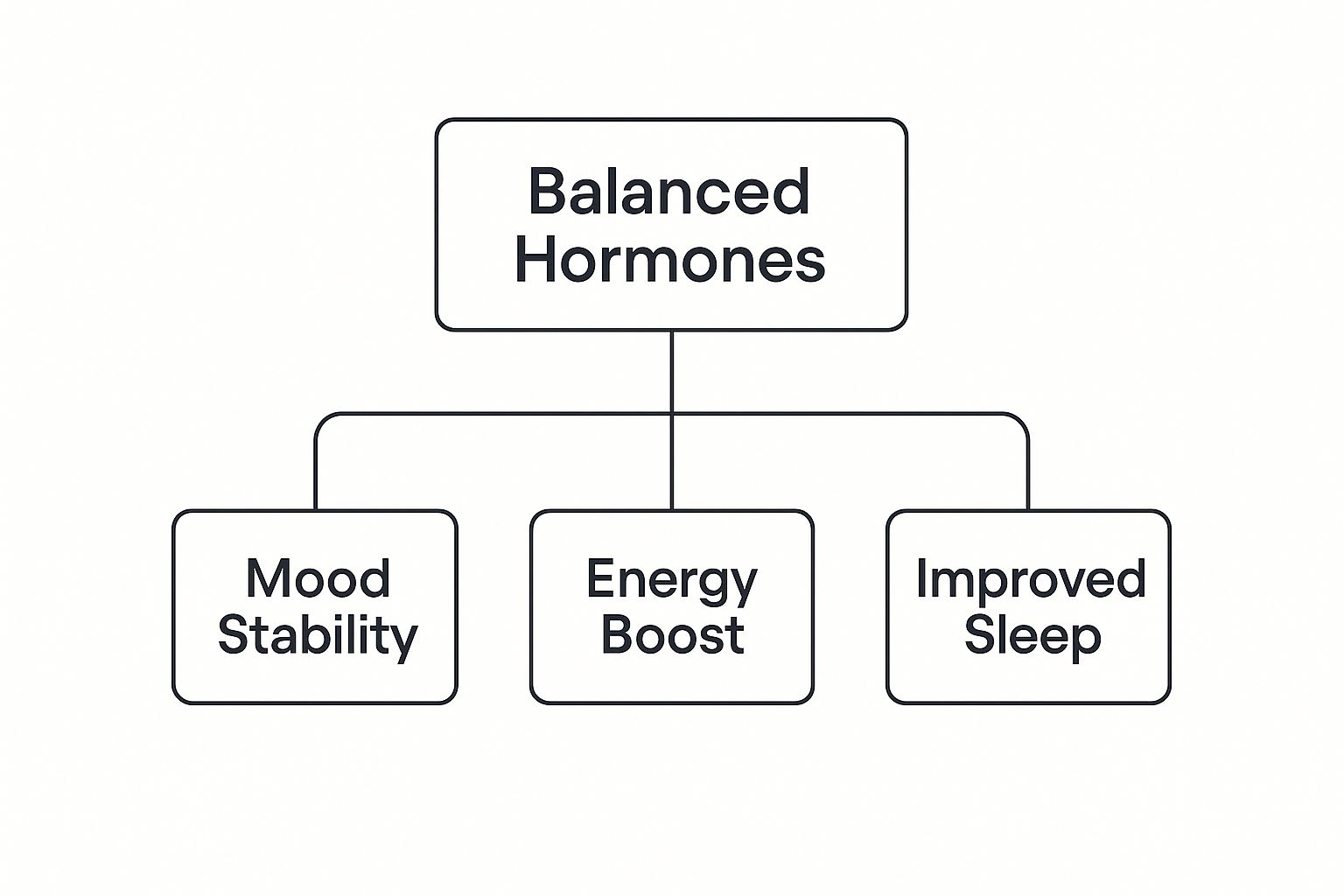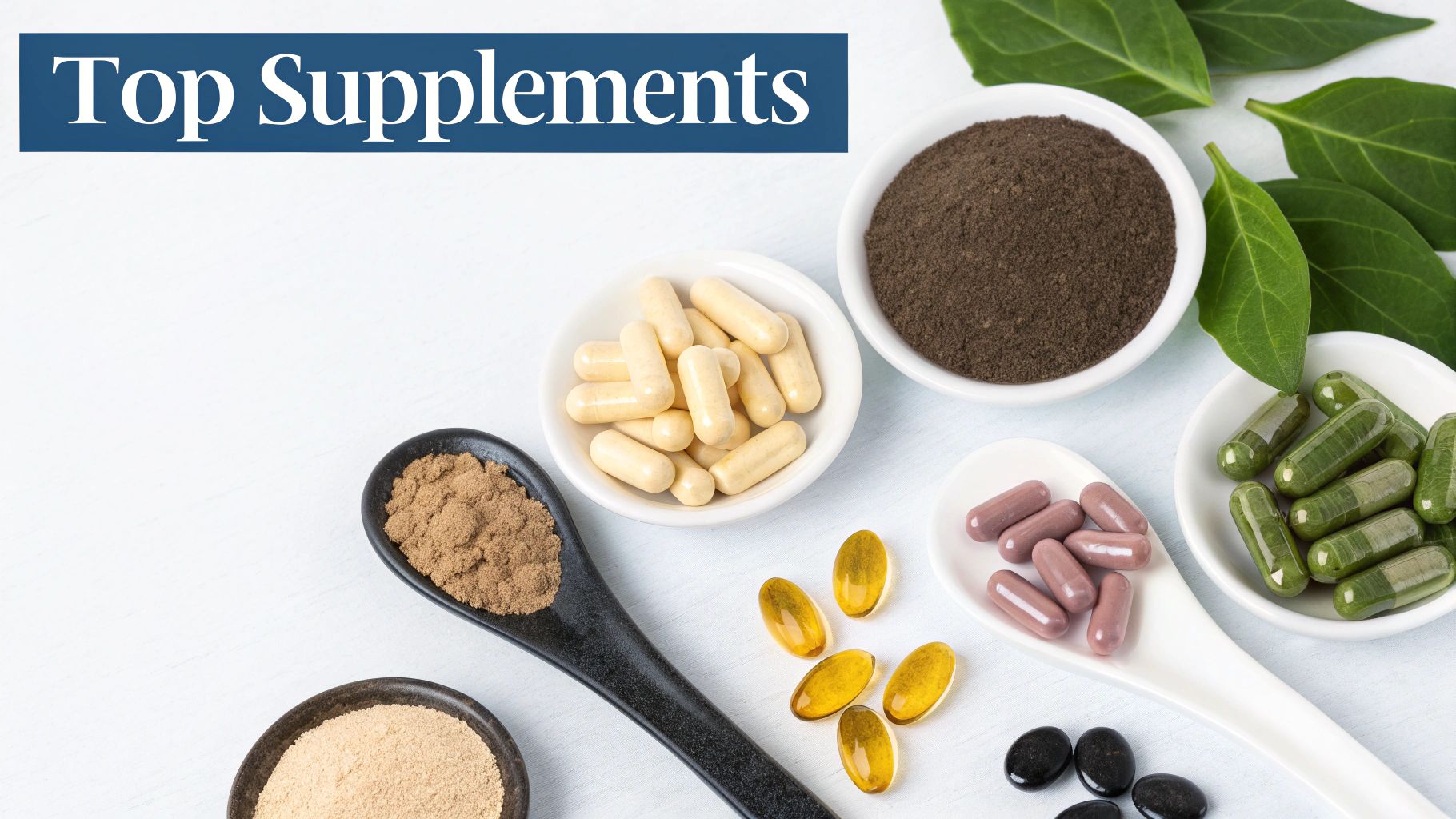When your hormones feel off, a few targeted supplements can be a game-changer. Your first step is to consider adding ashwagandha for stress, vitamin D for regulation, and magnesium to support your nervous system. These aren't magic pills; they are practical tools that provide your body with the raw materials it needs to manage its complex messaging system. The most crucial action you can take is to understand what your body is trying to tell you and then respond with targeted support.
Your Guide to Understanding Hormonal Health

Before choosing specific supplements, your first action is to get a handle on what’s actually going on inside. Imagine your hormones are like an orchestra. For the music to sound right, every instrument needs to be perfectly in tune and playing in time. If one section is off-key, the whole performance suffers.
This delicate network of chemical messengers runs the show, controlling everything from your mood and energy to how well you sleep. When that balance gets thrown off, you might feel constantly drained, snappy for no reason, or find yourself staring at the ceiling all night. Don't dismiss these feelings; treat them as signals from your body that its internal communication lines are crossed.
Recognising the Signs of Imbalance
The most important first step is to learn to listen to your body. Hormonal issues don't just pop up out of nowhere. They usually start as subtle, nagging symptoms that are all too easy to brush off as just "being busy" or "stressed out."
Take action by looking for these common clues that your internal orchestra might need a tune-up:
- Persistent Fatigue: That bone-deep tired feeling, even after a solid eight hours of sleep.
- Mood Swings: Finding yourself unusually irritable, anxious, or just feeling flat.
- Poor Sleep Quality: Tossing and turning, or struggling to fall and stay asleep.
- Unexplained Weight Changes: The scales are creeping up (or down) without any real change to your diet or exercise.
- Skin Issues: Stubborn adult acne that seems to hang around, especially on your jawline.
Noticing these patterns is your starting point for making smarter choices about your health.
A hormonal imbalance is really just a communication breakdown. Your body is trying to send messages, but the signals are getting scrambled. The whole point of using targeted nutrition and supplements is to clear those lines so your system can get back to running smoothly.
The Role of Nutrition and Supplements
This is where you can take action with smart nutrition and supplements for hormones. A good diet lays the groundwork, but modern life—with all its stress and environmental pressures—can leave gaps in our nutrition. And the market reflects this growing need. The UK menopause sector alone, which is heavily centred on hormonal support, brought in around USD 490.1 million last year. Dietary supplements were the biggest slice of that pie, and the market is tipped to hit nearly USD 648.1 million in the next five years. You can learn more about the growing market for menopause support in the UK.
Supplements act like reinforcements. They deliver a concentrated hit of the specific vitamins, minerals, or herbs your body is crying out for. They won't replace a healthy lifestyle, but they can be a powerful tool to help restore balance and give your body the precise resources it needs to get back in sync.
The Four Foundational Nutrients for Hormone Support
Every strong building needs a solid foundation, and your hormonal health is no different. Before you even get into specialised herbs and adaptogens, your first priority should be ensuring your body has the core building blocks it needs to function properly. These four foundational nutrients are the bedrock of hormone production and regulation.
Think of your endocrine system as a factory. Without these essential raw materials, the entire production line can grind to a halt or start making mistakes, leading to the imbalances that leave you feeling… well, off. Getting these right is the first, most powerful step you can take towards feeling your best.
The image below shows how getting your hormones balanced with the right nutrients leads to real improvements in mood, energy, and sleep.

This isn’t just some abstract goal; hormonal balance delivers tangible benefits that make a real difference to your daily quality of life.
Vitamin D: The Sunshine Vitamin
We often call it the ‘sunshine vitamin’, but Vitamin D acts much more like a hormone in the body. It’s absolutely crucial for everything from your immune system to bone health, but it also plays a starring role in keeping other hormones in check, including insulin and those churned out by your pituitary and adrenal glands.
A huge number of people in the UK are deficient, especially during the darker winter months. Low levels of Vitamin D are often linked to more severe hormonal symptoms, including those seen with PCOS and premenstrual syndrome (PMS).
Here’s how you can take action to keep your levels topped up:
- Get Sensible Sun Exposure: Aim for 10-20 minutes of midday sun on your arms and legs a few times a week in spring and summer.
- Eat Vitamin D-Rich Foods: Actively include fatty fish like salmon and mackerel, egg yolks, and fortified foods in your regular diet.
- Consider a Supplement: For most UK adults, taking a daily Vitamin D3 supplement from October to March is a smart, proactive step.
Magnesium: The Calming Mineral
Magnesium is a true powerhouse, involved in over 300 different processes in the body. When it comes to hormones, its most important job is helping you manage stress. It helps to regulate cortisol (your main stress hormone) and supports the production of calming brain chemicals like GABA.
Think of magnesium as your body’s natural brake pedal. If you’re deficient, you can feel constantly 'switched on', anxious, and unable to get a decent night's sleep – all things that throw your hormones completely out of whack.
Take these steps to boost your magnesium intake:
- Focus on Dietary Sources: Load up on leafy greens like spinach and kale, nuts and seeds (almonds and pumpkin seeds are great), and even a bit of dark chocolate.
- Supplement Smartly: Choose a magnesium glycinate supplement, as it's a fantastic form that's highly absorbable and gentle on the stomach.
Magnesium is often one of the first minerals to be depleted by chronic stress. Actively replenishing it is a simple yet powerful action you can take to support your nervous system and, by extension, your hormonal health.
Zinc: The Hormone Regulator
Zinc might be a trace mineral, but it punches well above its weight in hormonal health. It’s essential for producing thyroid hormones, which run your metabolism, and it plays a key part in regulating reproductive hormones like oestrogen and testosterone.
It also has potent anti-inflammatory properties. This is especially important for things like hormonal acne, where inflammation and oil production are kicked into overdrive by hormonal shifts. In fact, research shows a clear link between low zinc levels and more severe breakouts.
If you want to dive deeper into the essential nutrients, you can explore our full list of the 7 best vitamins for hormone balance in our 2025 UK guide. It offers more insight into how specific vitamins keep you feeling well.
B Vitamins: The Energy Co-Factors
The B-vitamin complex isn't just one vitamin, but a family of eight that work together. They're vital for energy production, brain function, and helping your liver do its crucial job of clearing out old hormones, which prevents them from building up and causing trouble.
Vitamins B6, B9 (folate), and B12 are the real stars here. B6 helps make progesterone and the mood-lifter serotonin, while B12 is key for fighting off fatigue. Because B vitamins are water-soluble, your body can’t store them for later, so your daily action is to get a consistent supply from foods like lean meats, eggs, legumes, and whole grains.
Here’s a quick-glance table to help you get started with food sources.
Essential Vitamins and Minerals for Hormonal Balance
This table summarises some of the most important micronutrients, their roles, and how you can find them in your diet.
| Nutrient | Role in Hormone Health | Excellent Food Sources |
|---|---|---|
| Vitamin D | Acts as a pro-hormone, influencing insulin sensitivity and reproductive health. | Fatty fish (salmon, mackerel), egg yolks, fortified milk, sunlight exposure. |
| Magnesium | Regulates the stress response by controlling cortisol and supporting GABA production. | Leafy greens (spinach), nuts (almonds), seeds (pumpkin), dark chocolate. |
| Zinc | Essential for thyroid hormone production and balancing oestrogen and testosterone. | Oysters, red meat, poultry, beans, nuts. |
| Vitamin B6 | Supports progesterone production and helps create mood-regulating neurotransmitters. | Chickpeas, tuna, salmon, potatoes, bananas. |
| Vitamin B12 | Crucial for energy metabolism and preventing fatigue linked to hormonal fluctuations. | Meat, fish, milk, cheese, eggs. |
| Folate (B9) | Works with other B vitamins to support detoxification pathways in the liver. | Leafy greens, lentils, asparagus, broccoli. |
Make it your goal to build a diet rich in these foods. This is the perfect starting point for building a strong hormonal foundation from the inside out.
Harnessing Adaptogens and Herbal Supplements

While essential nutrients lay the groundwork for good health, you can use adaptogens and herbal supplements for next-level support. Think of them as smart thermostats for your body’s stress response system. Rather than just cranking the heat up or down, they help your body adapt to whatever life throws at it, nudging you back towards balance without any drastic swings.
When you're constantly under pressure, your adrenal glands can get totally overworked, which often leads to hormonal chaos. The action adaptogens take is to moderate this whole process, bolstering your body's natural resilience so you don’t overreact or completely burn out. These incredible botanicals have been staples in traditional medicine for centuries, and modern science is finally catching up, revealing just how profound their effects on hormonal health really are.
Bringing these herbs into your routine can be a game-changer for managing stress, boosting your energy, and getting back to that feeling of equilibrium. Let's dig into some of the most effective and well-researched options out there.
Ashwagandha The Stress Soother
Ashwagandha is probably one of the most famous adaptogens, and for very good reason. Its real superpower is its ability to help regulate cortisol, your body's main stress hormone. When cortisol levels are stuck on high, it can throw everything off, from your sleep cycle to your reproductive hormones.
This potent herb supports your HPA (hypothalamic-pituitary-adrenal) axis—the command centre for your entire stress response. By helping to calm this system down, Ashwagandha can lead to less anxiety, better quality sleep, and a much more stable mood.
Think of Ashwagandha as a supportive friend for your adrenal glands. It doesn't make stress disappear, but it helps your body handle its reaction much more effectively, preventing that all-too-familiar hormonal domino effect.
If you’re keen to explore more ways to get your stress hormones in check, our guide on 8 natural ways to reduce cortisol offers more actionable steps for 2025 is a great place to start. It pairs perfectly with a smart supplement routine.
Maca The Energy and Libido Booster
Hailing from high in the Andes mountains, Maca root is a nutritional powerhouse celebrated for its knack for enhancing energy, stamina, and libido. But unlike stimulants that give you a temporary buzz followed by a crash, Maca works by nourishing your endocrine system. It supports overall hormonal balance without actually containing any hormones itself.
It's particularly praised for its ability to support reproductive health in both men and women. Some studies suggest it can help ease the symptoms of menopause, improve fertility, and give sexual function a welcome boost. It does this by giving your body the raw materials it needs to produce its own hormones correctly.
Here’s a simple action plan for incorporating these herbs:
- For Ashwagandha: Look for powders or capsules. A common starting dose is 300-500 mg a day.
- For Maca: Choose gelatinised powder, which is gentler on the stomach. Start by adding one teaspoon into a smoothie or your morning porridge.
Shilajit The Mineral-Rich Rejuvenator
Shilajit is a unique, tar-like resin that seeps from rocks in high mountain ranges like the Himalayas. It’s formed over centuries from the slow decomposition of plants, making it incredibly rich in minerals and a powerful compound called fulvic acid.
Fulvic acid is the real star of the show. It acts like a shuttle service, helping to transport minerals directly into your cells to boost their absorption and effectiveness. This mineral infusion supports energy production right at the cellular level, helping to fight fatigue and promote a deep sense of vitality.
When it comes to supplements for hormones, Shilajit's incredible mineral profile helps to fill in the nutritional gaps that often lead to imbalances. It’s especially well-regarded for its ability to support healthy testosterone levels and improve physical endurance. Oji Shilajit gummies, for example, offer a clever way to get this powerful resin, combined with other adaptogens, in a convenient and tasty form.
How to Choose Quality Herbal Supplements
Let's be honest, not all herbal supplements are created equal. The market is flooded with products of wildly different quality and potency. To make sure you’re getting something that’s both effective and safe, you need to take action and choose carefully.
Actionable Steps for Selecting a Quality Product
- Check for Standardisation: Look for products that are standardised to a certain percentage of their active compounds (for Ashwagandha, this would be withanolides). This is your guarantee that you’re getting a consistent and potent dose every time.
- Seek Third-Party Testing: The best brands will have their products tested by an independent lab to verify their purity and potency. This is how you know your supplement is free from nasty contaminants like heavy metals or pesticides.
- Understand the Form: Herbs come in all shapes and sizes—powders, tinctures, capsules, and even gummies. Pick the one that fits your lifestyle. A gelatinised Maca powder is better if you have a sensitive stomach, while Shilajit gummies are a brilliant way to avoid the resin’s famously strong taste.
By adding these herbs to your routine, you’re giving your body targeted support to better manage stress and find its natural rhythm. The real key is consistency and choosing high-quality sources to make sure you get the full benefits.
Getting to Grips with Phytoestrogens for Natural Support
When your body's hormonal landscape starts to change, especially around perimenopause and menopause, your top priority should be finding gentle, natural ways to keep things balanced. This is exactly where you can use phytoestrogens. They’re fascinating compounds found in plants that happen to look a lot like our body’s own oestrogen on a molecular level.
Think of it like this: you have a lock (an oestrogen receptor) and phytoestrogens are like a key that’s a close, but not quite perfect, match. When your natural oestrogen is low, they can pop into these receptors and give a mild oestrogenic boost, just enough to top things up. But if your oestrogen is high, they can occupy those same receptors, essentially blocking the stronger hormone from getting in and creating a much-needed balancing effect.
It’s this clever dual-action that makes them such a great tool. They offer a more subtle way to manage the hormonal ups and downs that can bring on frustrating symptoms like hot flushes and mood swings.
Easy Ways to Bring Phytoestrogens into Your Diet
Weaving phytoestrogens into your daily life can be simple and, best of all, food-based. The aim isn't to suddenly start eating huge amounts, but to consistently include small portions. This lets your body adapt gently and sustainably over time.
Here are the best sources and how to use them:
- Flaxseeds: These little seeds are an absolute powerhouse of lignans, a major type of phytoestrogen. To get the benefit, you must use ground flaxseeds. An easy action is to add one to two tablespoons of ground flaxseed into your morning porridge, smoothies, or yoghurt.
- Soy: Foods like tofu, tempeh, and edame are packed with isoflavones, another really effective phytoestrogen. A simple step is to add a serving of organic, non-GMO soy into your meals a few times a week. Toss cubed tofu into a stir-fry or snack on steamed edamame.
- Chickpeas and Lentils: Not only are these legumes full of fibre and protein, but they also give you a healthy dose of phytoestrogens. Add them to salads, soups, and curries for a no-fuss dietary boost.
By starting with these whole-food sources, you're not just getting phytoestrogens; you’re giving your body a whole spectrum of nutrients that all work together for better health.
Using Concentrated Supplements for Extra Relief
While it’s always best to start with food, sometimes you just need a more concentrated dose to get on top of persistent symptoms. This is where you can take action with supplements for more targeted support.
The market for phytoestrogen supplements in the UK is a specialised but fast-growing area. These supplements, based on plant compounds like isoflavones, are set to grow by about 9.29% each year for the next decade. This is really being driven by people looking for natural alternatives to synthetic therapies. You can find out more about the UK phytoestrogen supplements market growth here.
One of the most well-researched options out there is Red Clover.
This herb is especially rich in isoflavones and has been studied quite a bit for its ability to reduce how often and how severe hot flushes are. The thinking is that it works by providing that gentle oestrogenic lift right when the body’s own supply is dipping.
When you’re picking out a supplement like Red Clover, it’s really important to find one that's standardised to a specific amount of isoflavones. This just means you know you’re getting a consistent and effective dose every time. And just like with any supplements for hormones, the smartest approach is to start with a lower dose, see how you feel, and figure out if this natural path is the right one for your body.
How to Choose and Safely Use Hormone Supplements

Navigating the world of supplements for hormones can feel overwhelming. With countless bottles lining the shelves, all promising to bring you back into balance, how do you know what actually works? Don't just grab the first thing you see; create a smart plan to choose wisely and safely.
The supplement market is absolutely booming. In the UK alone, the industry is expected to grow from £5.19 billion to nearly £9.65 billion in the next eight years. While it’s easy to shop online, many people still prefer buying from trusted pharmacies where they feel more confident.
Follow these practical steps to become your own expert.
How to Read a Supplement Label Like a Pro
The label on that little bottle is your roadmap to quality, but only if you know what to look for. It’s about more than just a quick glance at the main ingredient; the real story is in the details.
Here’s what to zoom in on:
- Active Ingredients and Dosage: Check for the amount of the key ingredient per serving (like 500 mg of Ashwagandha). Ensure this matches up with the dosages known to be effective for your needs.
- The ‘Other Ingredients’ List: This is where companies list fillers and binders. Your goal is to find supplements with a short list, free from unnecessary junk like artificial colours or sugars.
- Specific Nutrient Forms: Not all vitamins and minerals are created equal. For example, magnesium glycinate is best for its calming effects and high absorption, while magnesium citrate is better for digestion. Your action is to learn the difference so you can pick the right tool for the job.
Spotting a High-Quality Product
The supplement industry isn't tightly regulated, which means the responsibility to find a good product often falls on you. Luckily, you can take clear steps to identify a trustworthy brand.
Keep an eye out for these markers of a quality supplement:
- Look for Third-Party Certifications: This is a big one. Check for logos from groups like NSF International or Informed Sport. This seal of approval means an independent lab has verified that the product actually contains what it says it does and is free from anything nasty.
- Demand Ingredient Transparency: Good companies are proud of where their ingredients come from. Look for information on their sourcing and how their extracts are made.
- Choose Standardised Extracts: When buying herbs, look for the word "standardised." This is your guarantee of a consistent amount of the active compound (for example, Ashwagandha standardised to 5% withanolides) in every single dose.
Before starting any new supplement, the most crucial step is to have a chat with a healthcare professional. They can look at your personal health history, make sure there are no clashes with any medications you're on, and help you create a plan that’s truly safe and right for you.
Your Action Plan for Starting New Supplements
So, you’ve picked out a quality supplement. What now? How you introduce it to your routine is just as important as the product itself. A slow, methodical approach is the best way to figure out if it's a good fit for your body.
Follow these simple steps for a safe and effective start:
- Start Low and Go Slow: Always begin with the lowest effective dose suggested on the packaging. This gives your body time to adjust and reduces the risk of side effects. You can always increase it later if you need to, but never go over the recommended amount.
- Introduce One at a Time: If you start taking five new things at once, you'll have no clue what’s working—or what’s causing a problem. Add one new supplement at a time and give it at least a couple of weeks before introducing anything else. For ideas on where to start, our guide on the top supplements for hormonal imbalance can help you decide.
- Track How You Feel: Grab a notebook and jot down a few notes each day. Are you sleeping better? Is your energy more stable? Have any new or weird symptoms popped up? This simple record is the best way to know what’s genuinely making a difference for you.
Your Questions Answered: Getting Started with Hormone Supplements
Dipping your toe into the world of supplements for hormones can bring up a lot of questions. That’s completely normal. To help you move forward with confidence, here are straightforward answers to some of the most common queries.
This is your practical guide to cut through the jargon and give you a clear picture of what to expect.
How Long Until I See a Difference?
This is the big question, isn't it? The honest answer is: it varies. There's no magic timeline, because how you respond depends on the specific supplement, your own unique body chemistry, and what you’re trying to achieve. Your body needs time to adapt, so the best action you can take is to be patient and consistent.
Here’s a practical timeline:
- Short-Term (a few weeks): For foundational nutrients like magnesium, you can start to feel a difference fairly quickly. Look for better sleep or a calmer mood within just a few weeks of daily use.
- Medium-Term (1-3 months): This is the key window for herbal adaptogens like Ashwagandha and Maca. You need to take them consistently for 2-3 months to feel their full balancing effects on your stress levels and energy.
- Long-Term (3+ months): For bigger shifts, like regulating your menstrual cycle or finding relief from menopausal symptoms, you must stick with it. Lasting change requires several months of dedication.
The main takeaway? Supplements aren't a quick fix. They work with your body, gently nudging it back towards its natural rhythm over time.
Can I Just Take a Bunch of Supplements at Once?
It’s tempting to create a "super-stack" of supplements, hoping for faster results. But this is one area where more isn't always better. In fact, you should approach this with caution and professional advice. Some nutrients and herbs can actually compete with each other for absorption or have unwanted interactions.
The smartest action is to go slow. Introduce just one new supplement at a time. Give your body a few weeks to get used to it and pay close attention to how you feel. This methodical approach is the only way to figure out what's genuinely helping you and what might not be a good fit.
Piling on multiple supplements without understanding how they work together can just overload your system. Before you start mixing and matching, have a chat with a healthcare provider or a registered nutritional therapist. They can help you build a plan that's both safe and effective for you.
Are "Natural" Supplements Always Safer Than HRT?
The word "natural" feels safe, but it doesn't automatically mean "risk-free." Herbal supplements contain powerful, bioactive compounds that have real effects on your body. They can come with their own side effects and can sometimes interfere with prescription medications.
Choosing between natural supplements and Hormone Replacement Therapy (HRT) is a very personal decision. The right action is to make it after a proper chat with your doctor, taking into account:
- Your specific symptoms and how severe they are.
- Your personal and family medical history.
- Your own individual risk factors.
Both options have their own set of pros and cons. The best choice is the one that fits your unique health needs, made in partnership with a medical professional who sees the whole picture.
If I'm Taking Supplements, Does My Diet Still Matter?
Yes, a thousand times yes! This might be the most important point of all. Supplements are meant to supplement a healthy lifestyle—they can't replace it. You simply cannot out-supplement a poor diet.
Your first and most important action is to build a strong dietary foundation. Think of it like building a house. A balanced diet—full of whole foods, lean proteins, healthy fats, and lots of fibre—is your foundation. It gives your body all the essential building blocks it needs to function properly.
Supplements are the specialised tools you bring in to reinforce certain areas. They can fill in nutritional gaps, offer targeted support for stress, or help manage specific symptoms. But without that solid foundation, they just won't be as effective. For the best possible results, your supplement strategy has to be built on the bedrock of a good, nutrient-dense diet.
Ready to support your body’s natural balance with a convenient, powerful solution? Oji Shilajit offers a unique blend of over 85 trace minerals and potent adaptogens in a simple, zero-sugar gummy. Start your journey towards renewed energy and vitality today.
Discover the benefits of Oji Shilajit and reclaim your balance








